
“A lot of the economic development proposals that we thought were good for smart growth passed,” Wolf said. “Those are embodied primarily in Governor Raimondo’s economic development package.”
He mentioned funding to incentivize development on the I-195 land, a fund for streetscape improvements on main streets of cities and towns, special incentives towards transit development, and others.
But the Rebuild RI tax credit could be the most impactful piece of the governor’s economic development package, he said. In its final form, there are opportunities for small historic rehabilitation projects, something that Grow Smart advocated for, and spoke to the Raimondo administration about.
“If the Rebuild RI tax credit does provide significant opportunities for large and small historic rehab projects, then that could be the single most important item,” Wolf said. “It provides continuing state incentives for redeveloping some of our tremendous collection of historic buildings, most of which are located in urban areas, many in distressed urban areas.”
Wolf added that the tax credit program also provides funding for the redevelopment of vacant lots in cities and towns. These lots could be turned into a number of things for public use, but Grow Smart is advocating for some to be converted into grocery stores, as many urbanites have difficulties accessing one.
“As a group that wants to see development occur primarily in cities versus rural areas, we think that this Rebuild RI tax credit is going to stimulate that kind of development,” Wolf said.
Looking toward the future, Grow Smart has plans for the short and long term. For the rest of the year, they’ll be focusing on educating towns and municipalities about the new tools they have, such as the Rebuild RI tax credit, to implement smart growth standards in their public centers.
“Our focus for the next four or five months is going to be to try to make sure that municipalities and developers, both for profit and nonprofit, that are interested in rehabilitating specific historic structures, fully understand how they can facilitate that through the Rebuild RI program,” Wolf said.
During this time, Grow Smart will become a resource for these groups to ensure that their process goes smoothly, but also to get as many historic rehab projects approved as possible. They’ll also be providing assistance for some of the bond issues that were passed last November, especially an environmental bond that includes $5 million for the redevelopment of contaminated sites, or brown fields. Wolf said that this bond is a big step forward, since it’s the first time that state money has gone toward such a project.
Wolf added that Grow Smart also plans to work with the governor’s administration to develop a technical assistance for local governments so they can better use the new tools that have been given to them for redevelopment, such as tax increment financing, which can be used to put the funds together for brownfield development.
In the long term, Wolf said they have several goals, but they all boil down to building a stronger economy, while maintaining Rhode Island’s personality. This all includes employment for city residents, strengthening farms and locally produced agriculture, and a more user-friendly transportation system.
“In a broad sense, our in Rhode Island, and the work nationally in the smart growth movement, is about changing the predominant development pattern in America, which has existed for the past 70 years or so, which has been a very auto dependent, suburban oriented development pattern,” he said. “We’re not anti suburban, and we’re not anti auto, but we think that we need a more balanced approach than what we’ve had in the state and in the country for decades.”
A successful year can’t happen without some marked failures, though. Grow Smart was a staunch supporter of Governor Raimondo’s RhodeWorks legislation, which tore a rift between the House and Senate last session. While the revised bill passed in the Senate, it didn’t even reach the floor in the House, with Speaker Mattiello urging for further study. The bill would use tolls on tractor-trailer trucks to cover the costs of rebuilding deficient bridges, as well as support a more modern transit system.
“We’re disappointed it didn’t pass both houses, but we think there’s a good chance it’s going to be approved either later this year or early next year. We’re working with the Raimondo administration, especially the state department of transportation, on that proposal,” Wolf said.
He was also disappointed that there was not a specific and significant commitment to multi-year funding for historical rehabilitation projects added to the state historic tax credit program.
RhodeMap RI was presented another sticky situation for Grow Smart. While it did pass as legislation, Wolf explained that there was so much controversy around the bill that it became hard to use it as the basis for any policy decisions. The bill included expansions for affordable housing, which conservative activists called “socialist,” fearing the takeover of municipal zoning regulations.
Although the plan was ultimately approved, Grow Smart’s main concern after the public uproar it caused was that it would sit on a shelf and have no policy effect whatsoever. However, Governor Raimondo’s economic development package includes many of the basic priorities that Rhode Map sought to achieve, and which Grow Smart supports.
“Our main commitment was to the goals and the proposed policies of RhodeMap, not to RhodeMap, the name or the brand,” Wolf said. “Our goal this sessions was to get as many of the initiatives that are in the spirit of Rhode Map approved as possible, and a lot of the governor’s economic development package is in that spirit.”
“If decoupling these ideas from RhodeMap is what’s necessary, politically, to have them enacted, then that’s a small price to pay,” Wolf added.
Even with the stigma surrounding RhodeMap, and the limbo that RhodeWorks currently lies in, Wolf said he is still very comfortable calling this legislative session a success for Grow Smart. As far as next year is concerned, their goals are still in the planning stage. For now, Grow Smart celebrates what they’ve already won, and not the battle ahead.
]]>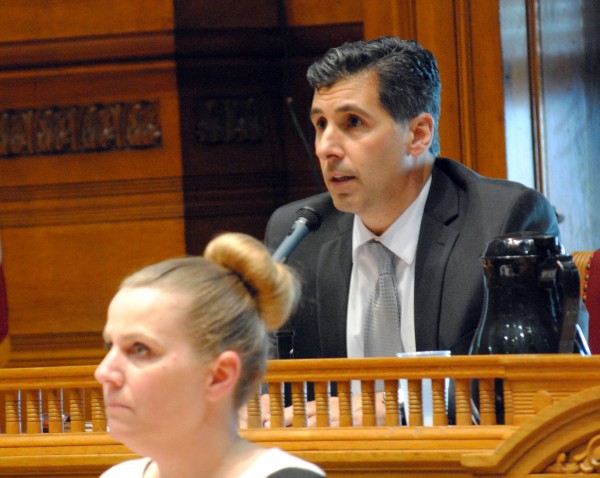
Last year, after the General Assembly stole away the power of cities and towns in Rhode Island to set their own minimum wages, Providence City Councillor John Igliozzi told a packed room of disappointed hotel workers that the city was not prohibited from imposing higher minimum wage standards via tax stabilization agreements (TSAs), which are contracts between cities and private industry, and cannot be interfered with by the General Assembly.
Igliozzi said then that all future TSAs should include strong minimum wage requirements and many other worker protections and rights.
Igliozzi is the chair of the Providence City Council Finance Committee, so one would expect that he would follow up on this proposal, but so far, nothing like this has been incorporated into the new TSAs being cooked up in City Hall and expected to be voted on this week.
When Jesse Strecker, executive director of RI Jobs with Justice, testified before the Finance Committee of the Providence City Council, he presented a short list of proposals to ensure that whatever TSAs were adopted would truly benefit not just the investors and owners of billion dollar corporations but also the working people and families of Providence.
Strecker’s list included the following:
1. Provide good, career track jobs for Providence residents most in need by utilizing apprenticeship programs and community workforce agreements, hiring at least 50% of their workforce from the most economically distressed communities of Providence, with a substantial portion of that workforce made up of people facing barriers to employment such as being a single parent or homeless, or having a criminal record, offering job training programs so local residents are equipped with the skills necessary to perform the available jobs and hiring responsible contractors who do not break employment and civil rights law;
2. Pay workers a living wage of at least $15 per hour, provide health benefits and 12 paid sick days per year, and practice fair scheduling: offering full time work to existing employees before hiring new part time employees, letting workers know their schedule two weeks in advance, and providing one hour’s pay for every day that workers are forced to be ‘on call’;
3. For commercial projects, create a certain number of permanent, full-time jobs, or for housing developments, ensure that 20% of all units are sold or rented at the HUD defined affordable level. Or, contribute at an equivalent level to a “Community Benefits Fund,” overseen and directed by community members providing funding to create affordable housing, rehabilitate abandoned properties, or finance other community projects such as brown field remediation; and
4. Present projected job creation numbers before approval of the project, and provide monthly reporting on hiring, wages and benefits paid, and other critical pieces of information, to an enforcement officer, overseen by a Tax Incentive Review Board comprised of members of the public and appointees of the city council and mayor, to make sure companies are complying with their agreements, and be subject to subsidy recapture if they do not follow through.
Mayor Jorge Elorza submitted an amendment mandating that under the new TSAs, “projects over $10 million will be eligible for a 15-year tax stabilization agreement that will see no taxes in the first year, base land tax only in years 2-4, a 5% property tax in year 5 and then a gradual annual increase for the remainder of the term.”
In return, the “agreements include women and minority business enterprise incentives as well as apprenticeship requirements for construction and use of the City’s First Source requirements to encourage employment for Providence residents.”
But that short paragraph above contains few of the proposals suggested by Strecker.
Supporting the Jobs with Justice proposals are just about every community group and workers’ rights organization in Providence, including RI Building and Construction Trades Council, Direct Action for Rights and Equality (DARE), UNITE HERE Local 217, IUPAT Local 195 DC 11, District 1199 SEIU New England, RI Progressive Democrats of America, Teamsters Local 251, Fuerza Laboral / Power of Workers, Environmental Justice League of RI, RI Carpenters Local 94, Restaurant Opportunities Center RI (ROC United), Mount Hope Neighborhood Association, American Friends Service Committee, Occupy Providence, Olneyville Neighborhood Association (ONA), Fossil Free RI, Providence Youth Student Movement (PrYSM), Prosperity for RI, and the Brown University Warren Alpert Medical School Prison Health Interest Group.
]]>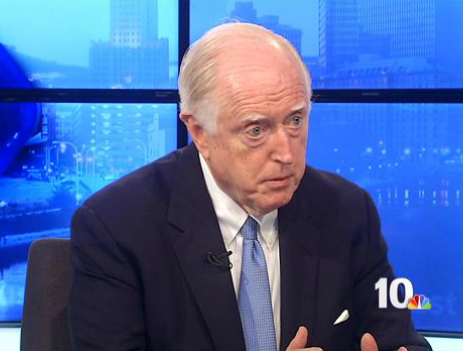 Rhode Island will not attract millennials, build a new economy, end homelessness or improve public schools by helping the Pawtucket Red Sox to move to Providence. Even according to Republican economist Greg Mankiw, 85% of economists oppose public subsidies of sports stadiums. Ideological journals from left to right, from National Review to Dissent, decry the giveaways and waste spent on stadiums for well connected owners.
Rhode Island will not attract millennials, build a new economy, end homelessness or improve public schools by helping the Pawtucket Red Sox to move to Providence. Even according to Republican economist Greg Mankiw, 85% of economists oppose public subsidies of sports stadiums. Ideological journals from left to right, from National Review to Dissent, decry the giveaways and waste spent on stadiums for well connected owners.
Here’s a few words from the critics…
1. James Hamilton, UC San Diego: “I am not aware of a recent example of a major sports facility investment that earned anything approaching a reasonable return on capital or turned out to be self-financing in terms of tax revenues.”
2.Grace Lee Boggs, Providence-born Detroit Civil Rights activist: “I am saddened by the short-sightedness,” Boggs said, referring to the recent building of more casinos and sports stadiums.”
3.Steve Lopez, LA Times: “It would be fun to have a pro football team to cheer and to boo… But as I’ve said before, the terms have to be right for citizens, not for AEG’s $7-billion man — Philip Anschutz — or for the band of barons who make up the National Football League.”
3. Joel Kotkin, an Urban Studies Fellow at Chapman University and author of The New Class Conflict:”… a fanciful approach towards economic development instead of building really good jobs. And except for the construction, the jobs created by stadia are generally low wage occasional work.”
4.Matt Connolly, writer with Mother Jones: “While there may be legitimate reasons for franchises to relocate—bankruptcy, low ticket sales, Jay-Z buying a stake—many recent threats to move have one common factor: stadium funding. If your local government decided against spending $400 million of public money to add a few more luxury boxes to Xtreme Cola Guzzle The Flavor® Memorial Arena, get ready to hear your team’s owner talking…”
5.Doug Bandow, National Review: “The primary justification for looting taxpayers to construct sports cathedrals is always “economic development.” …But that’s not the uniform experience. In D.C. itself you will have a hard time finding the renaissance that was supposed to be sparked by RFK stadium, which hosted the Redskins for years.”
6. Joan Didion, author, commentator: “What we had in the tarmac arrival with ball tossing then, was an understanding: a repeated moment witnessed by many people, all of whom believed it to be a setup and yet most of whom believed that only an outsider, someone too “naive” to know the rules of the game, would so describe it.”
Forget subsidizing sports stadiums. Funding a good old boy’s development scheme is not the answer to empower the working women and men of Rhode Island.
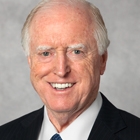 I really wanted to write a satire, but I just can’t get any more absurd than entire tax-payer-subsidy of a baseball stadium downtown.
I really wanted to write a satire, but I just can’t get any more absurd than entire tax-payer-subsidy of a baseball stadium downtown.
A bunch of rich white guys bought some baseball cards… er baseball slaves… er a baseball team… and they want us to cover their costs so they can take their clients and grandkids to a game.
Let’s just look at the facts behind a few assertions.
The team is taking a risk building it’s 38 Studios Stadium… Bullshit!
“We shouldn’t be taxed on something we put the money into,”
— James Skeffington owner of the In-Our-PocketSox
Really, James? Why not? Isn’t risk what private ownership is all about? You’re not taking any risk. You want…
- $4 million a year in kickbacks. (offset by a theoretical $2 million in tax revenue)
- a 30 year tax-free lease at $1/year on prime land in the center of Providence. Wait…. 30 years? No property taxes for Providence… Isn’t the team already threatening to welch on a tax-free lease in Pawtucket?
- The option to buy the land at fair market value after the lease expires. Hmmm. Let’s think about this. 30 years from now, after everything’s developed. They’ll argue that they have to pay to tear down the stadium to develop that piece of land, so… it’s not worth that much. And if they ditch again, guess who foots the bill for deconstruction?
- Has anyone mentioned the “naming rights” to this stadium? I can see a big jewelry company kicking in a few million dollars… Who gets this cash?
What risk are you taking? Fronting the money knowing that you’re going to get paid? I’ll tell you what… You promise to pay me $4 million a year, and I’ll give you $2 million a year. I promise!
Economic benefits for owners… And no one else
- Yes. People will get paid for construction.
- And politicians will get campaign contributions and photo-ops
- But raise your hands folks… how many of you have ever made a special trip to a minor-league ball game? Haven’t people been doing that at a lovely stadium in Pawtucket for years now? How much economic impact has that had? (Answer: NOT MUCH outside of Pawtucket)
- On February 21, The Providence Journal ran an article headlined, “Minor league baseball: Squeezed by low pay” Here’s a quote from the article, “It would be difficult to spin the numbers in any way that suggests minor-league baseball players earn minimum wage.”
- On April 17, that same paper ran an article, “Playing for free at McCoy Stadium rankles some bands” The PawSox are too cheap to pay bands to play. Hotdogs and soda? And they have to provide their own sound systems? Really?
If we don’t give them the money then the land will be empty and Rhode Island will go bankrupt…
- As I recall, this public land was supposed to be a public park. It wasn’t supposed to be the economic savior of the entire State.
- While empty land generates no revenue, it costs little to maintain and remains open for a real opportunity in the future.
- Future uses for the land could be:
- Taxable
- A benefit to the public
- Open more than a few hours a day.
- Useable in the winter time (which is fairly long…)
- Useable without the permission of a private corporation.
- Etc.
If we don’t bribe the team now, then there are plenty of other cities that will…
Bye bye. Good luck. Don’t let the door hit you on the way out.
]]>And apparently nobody did. I’ve seen articles in the paper. I’ve even tweeted reporters. Nobody’s asking the question, “Is this stadium going to be built on stilts?”
Here’s my mock-up of the location of the stadium cobbled together from the rough info we’ve received, plus an overlay of the flood zone maps.
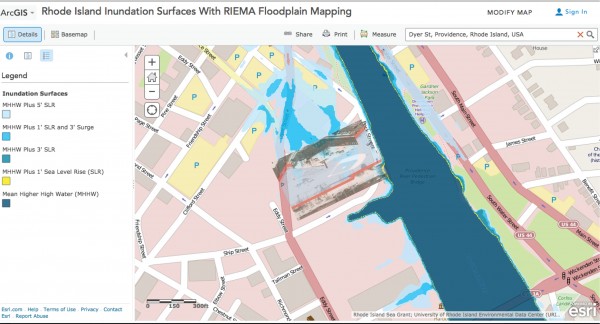
This map assumes sea level rises and storm surges. It doesn’t have potential hurricane or the 100 year flood levels.
So, here’s the pitch question…
“What are the new Sox owner’s plans to deal with or mitigate flooding during and after construction of a proposed stadium?”
Disclosures: I love baseball. I love Providence. I like the Pawsox. I don’t like public subsidies of businesses that will make millions and return little in the way of revenue and long-term growth/momentum to a city. Oh, and I’m not a GIS mapper…
]]>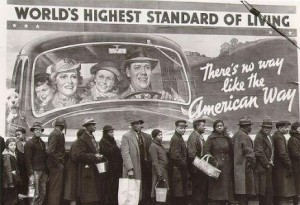 I am of the mind that the biggest issue facing the state right now is the sluggish economy. I know many share this belief. With that in mind, I will be focusing my (unfortunately limited) time writing specifically on creative strategies to improve Providence’s and the state’s economy, and thinking about it from the perspective of the upcoming gubernatorial and Providence Mayoral campaigns (i.e., what do the candidates have to say about what I write?). Before I delve into specific suggestions, I believe there are a few items relevant to economic growth that need to be clarified at the outset.
I am of the mind that the biggest issue facing the state right now is the sluggish economy. I know many share this belief. With that in mind, I will be focusing my (unfortunately limited) time writing specifically on creative strategies to improve Providence’s and the state’s economy, and thinking about it from the perspective of the upcoming gubernatorial and Providence Mayoral campaigns (i.e., what do the candidates have to say about what I write?). Before I delve into specific suggestions, I believe there are a few items relevant to economic growth that need to be clarified at the outset.
First, there isn’t much the government can do to improve the economy directly, particularly in this climate of economic distress and innovation paralysis. When the economy is running smoothly, most folks want the government to “stay out of the way.” But when the economy tanks, policymakers are the first to be blamed (this is a disingenuous and undeserved complaint), and everyone wants them to “fix it.” First, you can’t have it both ways people. Second, there is no magic solution to “fixing” the economy.
Second, economic growth takes time, commitment, alignment on a vision, and the autonomy to make things happen. It is unlikely to see radically positive results in a few months or even a couple years. Economic development is a decades-long strategy, that often requires partnerships and long-term planning that are challenging for public officials, policymakers, and civil service staff. While the pain of recessions, joblessness, and foreclosures is real, there are often few options for state and local officials to ease that pain.
Third, everything matters to economic development: education, transportation, infrastructure, workforce, land-use, zoning, existing markets, history, taxes, regulations, natural assets, etc. But each of these matter to varying degrees depending on the industrial sector and individual businesses. To assume that “lowering taxes” or “reducing regulations” is the most important of considerations is foolish, ill-advised, offensive, and immeasurably distracting from the various other issues that are generally much more important for long-term economic success. While everything is important, some things are more important than others.
 Fourth, every strategy comes with trade-offs and there are always winners and losers with any policy change. Typically, those with wealth and power can influence policy to their benefit. And while this may benefit them personally, or as a group, there are long-term consequences for the economy that are generally ignored. The incremental policy decisions that have been made in the past have led to our little state to lack the sufficient resiliency to bounce back from the recent and ongoing depression/recession. The economic conditions in which Rhode Island finds itself will take many, many years to rectify.
Fourth, every strategy comes with trade-offs and there are always winners and losers with any policy change. Typically, those with wealth and power can influence policy to their benefit. And while this may benefit them personally, or as a group, there are long-term consequences for the economy that are generally ignored. The incremental policy decisions that have been made in the past have led to our little state to lack the sufficient resiliency to bounce back from the recent and ongoing depression/recession. The economic conditions in which Rhode Island finds itself will take many, many years to rectify.
Fifth, demand for goods and services drives the supply of goods and services. If no one wants to buy stuff, stuff doesn’t get made, and people lose their jobs. Most tools that are deployed by cities and towns and the state try to stimulate the economy do not address economic demand, and as such they are largely inefficient and/or ineffective.
Sixth, underlying everything is an often ignored but crucial criterion: the importance of inclusive and dispersed economic growth. The benefits of economic growth need to be broadly shared because the more people who earn money, and the more money that they earn, the higher the level of economic growth. When economic growth benefits a small (and shrinking) number of people, aggregate demand declines and the economy suffers. When a rising tide actually lifts all boats, something that the post-WWII economy was notable for, everyone benefits. When a growing number of boats are chained to the bottom of the ocean, as has been the experience from the mid-1970s onward (with a notable exception during the 1990s), the economy flounders, people fall deeper in debt to maintain their standard of living, and the economy slows.

Seventh, the ONLY way the state (or any state, region, city, etc.) can be successful in the long-run is by improving its competitiveness in particular economic areas. This can be done by increasing the productivity of existing businesses through innovation or better trained employees or achieving higher workforce participation rates, while ALSO supporting the high and rising wages and living standards of Rhode Islanders. Period. This is hard to do, but not impossible. The role the city and state can play is to lay the groundwork for an iterative process of successive improvements to support business productivity gains and assist with the dispersion of economic benefits.
Eighth, when we discuss economic development, it’s important to differentiate between locally-traded clusters, sectors, and industries and those that are subject to larger markets, regional, national, or global in scope. The first group includes restaurants, local health services, residential housing construction, etc. while the second group includes software development, manufacturing, higher education, etc. The success of the first group is largely dependent upon the success of the latter. To put it another way, an economy can only grow by exporting lots of high-value goods and services and bringing in money to the state from other parts of the country / world. The degree to which the economy is exposed to and successfully competes in global markets is the single largest factor that explains how successful its local economy is. This isn’t to say that the local economy isn’t important, just that everyone selling hamburgers to each other does not grow the economy.
Finally, businesses grow at various points over their lifecycle. The only businesses that are guaranteed to have net positive job growth are new businesses, for the obvious reason that they will employ at minimum the owner of the business and they have no current employees to let go. Many businesses grow to a certain size and stay there for their entire existence. Many businesses have dramatic fluctuations in their employment based on seasonal or market demand. Some businesses have limited but sustained growth. And only a few businesses experience pronounced growth, and that growth is generally limited to a short period of time. All of this is important when it comes to growing jobs because there are only limited opportunities to identify and support existing businesses during their growth phases. But the opportunities are innumerable to support new business growth, and it is new business startups that have been responsible for net new job growth in the past decade.
There are additional factors that contribute or impede economic growth, but in my mind, the 9 above are of paramount importance. Feel free to bookmark this post as I will update it as I begin listing specific strategies to Rebuild Rhode Island!
]]>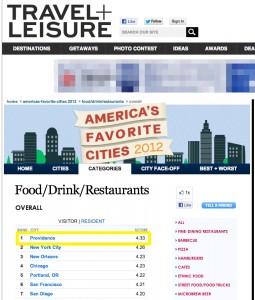
Recently, Johnson & Wales University President Mim Runey shared with the Providence Journal the university’s efforts to help grow the city’s thriving food cluster. She highlighted a few stats that show how RI’s food cluster has grown over the last decade, contributing to the local economy:
- Industries involved in “purchased meals and beverages” grew from $1.6 billion to just under $1.8 billion.
- Industries in “accommodations” grew from $286 million to $416 million.
- Jobs in food services and drinking places grew by 10 percent.
- Jobs in accommodations grew by more than 8 percent.
- Jobs in food and food-related occupations grew by 9.3 percent.
I was fortunate enough to be on the project team when the Initiative for a Competitive Inner City and Next Street worked with JWU leadership as JWU thought strategically about how to better position itself as a key leader in the food cluster. JWU is exploring innovative opportunities in all business components of the cluster, including marketing, entrepreneurship and new business development. While JWU continues to be a key contributor to Providence’s food cluster growth, there are also many other reasons why Providence can (and should) be a leader in food.
Providence’s food renaissance began emerging over many years, beginning with the proliferation of community farms and farmer’s markets across the state. Not unlike many regions of the country, consumers in Rhode Island became increasingly conscientious of healthy food and sustainable agriculture. While the Southside Community Land Trust began in 1981, demand for local and organic food grew in earnest throughout the late 1990s and early 2000s. Farm Fresh RI was created in 2004 to support the local food system by building capacity along the entire food value chain: producers, markets, and consumers. Today, the state ranks as one of the highest for direct sales specifically because of the success of the many farmers markets, stands, and CSAs. There are over 600 farms in Rhode Island, and at least one farmers market in every town. The system of farmers markets in the state has driven over 40% of the growth in the agricultural economy over the last 10 years. Many JWU faculty and alumni are known for using locally-sourced ingredients for classroom instruction and at RI restaurants owned and operated by JWU culinary experts.
In no small part, the advocacy and leadership of the RI Food Policy Council was a boon for local farmers, including the Rhode Island Food Assessment, “a comprehensive resource for stakeholders throughout the state who are working to strengthen the Rhode Island food system … [to] move food from Rhode Island farms and fisheries to consumers in all Rhode Island communities.” The Council focuses on increasing access to local healthy food, increasing the production of and demand for local food, promoting sustainability, and generating equitable economic opportunities for all Rhode Islanders. Additionally, the Rhode Island Agricultural Partnership’s 5-year strategic plan is aligning the efforts of the state’s agricultural producers and creating a single vision for agriculture in Rhode Island.
But the food cluster is more than community gardens and farmers markets. Providence has also developed a very dense food truck scene over the past 4 or 5 years. It can be argued that Providence started the mobile food trend when Walter Scott created the first horse-drawn diner wagon in 1872. The Haven Brothers Diner has had its perch next to Providence’s city hall since the 1950s. More recently, dozens of new food trucks have popped up offering an assortment of foodstuffs that is dizzying: wood-fired pizza, Korean BBQ, grilled cheese sandwiches, tacos, mac ‘n cheese, pulled pork, pudding pops, and cupcakes to name only a few. The expansion of mobile food choices is providing food entrepreneurs opportunities to enter the food business with minimal capital costs.
Additionally, the entire food distribution system is changing with the recent creation of Market Mobile, an online ordering and delivery system that connects farms to restaurants, grocers, schools and hospitals around Providence, Newport, Westerly and the Boston metro area. In 2012, family farmers and producers sold $1.5 million of local food through Market Mobile, a 50% increase from 2011.
The Farm to School initiative fosters healthy eating habits in children and every public school district in the state participates to some degree. In the 2011-2012 school year, the state’s public schools spent $175,000 on food from RI farmers, about 250,000 pounds of locally-grown produce and milk. In 2013, Farm to School is expanding its reach to connect farmers with pre-K, private schools, colleges, and hospitals. One challenge to scaling these programs is the distribution channels of the food service companies that currently service institutions in the state. School districts, however, can and should increase local procurement requirements upon renewal of food service contracts.
Additional innovations in the food cluster are on the horizon, including a permanent, year-round Public Market in Providence that will include a wholesale aggregation and distribution center, public kitchen space, a kitchen incubator, and a nutrition classroom. There is an enormous shared value opportunity for JWU to support and benefit from this endeavor and creating innovative new pathways for JWU graduates.
Johnson & Wales University and its Culinary Arts program is a strong key player in Providence’s growing food cluster, enmeshed in an ecosystem that supports and reinforces it in innumerable ways. Rhode Island has a history of marine research driven by the University of Rhode Island and leads the nation in shellfish farming innovation and sustainable fishing. In June, the Sustainable Agriculture and Food Systems Funders held its 2013 Annual Forum in Providence, and last month the 2013 Ronald C. Baird Sea Grant Science Symposium was hosted in Warwick, at which “The Future of Shellfish in Rhode Island” was presented. Innovation in food production and distribution is a critical element for the food cluster and can strengthen Providence’s competitive advantage.
JWU is embracing its own strategic commitment to blend the culinary arts with science through the JWU / Tulane University School of Medicine’s culinary medicine collaboration. This is the first time a medical school and a major culinary institution will partner to develop joint curriculum for doctors, medical students, chefs and the community about the significant health role that food choices and nutrition play in preventing and managing obesity and associated diseases in America. Other university stakeholders include Nutrition and Food Sciences at the University of Rhode Island, Packaging, Illustration, andIndustrial Design at the Rhode Island School of Design, and Innovation Management and Entrepreneurship and Medicine at Brown University.
Providence is also the home of United Natural Food Inc., the nation’s largest distributor of organic and natural foods, innovative high-growth companies likeEdesia, selling nutritious ready-to-use foods to treat malnutrition in 35 countries around the world, and food-related social ventures like Amos House’s Culinary Education Program and Friendship Café and RallyRI, an organization focused on create startup businesses in four economic sectors including food.
The food cluster is supported by organizations such as Eat Drink RI which shares information about the state’s food community and RI Food Fights, a hosting of light-hearted public culinary competitions in various categories. Lastly, Edible Rhody tells the stories of the state’s farmers, chefs, fishers and food and beverage artisans who work and live in Rhode Island.
Providence does food right! And this is why Providence was named as host city for the very first Taste Trekkers food tourism conference held on September 20-22. Moreover, many of the accolades for the nation’s best food that are awarded to Providence are due to the culinary expertise and entrepreneurism of JWU graduates. JWU is a strong reason why Providence’s food cluster has been growing while the rest of the state economy flounders.
]]> For a site with such an optimistic name, it’s funny how you can always count on Anchor Rising to pounce on anything that can be spun to reflect poorly on the state of Rhode Island. No, the glass is not half full according to that other blog; it’s defective, leaking, and surely the fault of a public employee somewhere.
For a site with such an optimistic name, it’s funny how you can always count on Anchor Rising to pounce on anything that can be spun to reflect poorly on the state of Rhode Island. No, the glass is not half full according to that other blog; it’s defective, leaking, and surely the fault of a public employee somewhere.
The latest example of this comes from Justin, Rhody’s littlest think tanker and a guy who truly puts the “dismal” in the dismal science. What’s got Justin so concerned this time is Rhode Island’s ranking in the “Kauffman Index of Entrepreneurial Activity”:
If we accept the proposition that a struggling economy leads more people to start their own businesses in order to generate their own income, then Rhode Island’s position on the Kauffman Index’s ranking is worrisome. The Ocean State ought to be highly entrepreneurial, because its employment situation is so bad. The other two states with unemployment rates above 10% are near the top of the entrepreneurialism list.
Rhode Island is tenth from the bottom.
Fair enough, and for the fringe-right that’s more than enough to begin wailing that the sky is falling. But what Justin doesn’t tell you, is that there are big regional differences between the states and that the index slants heavily towards those states with large construction sectors, an immediate disadvantage to densely populated states like RI.
But the larger point here is an obvious one: not all states start at the same place! In fact, Rhode Island has shown incredible growth in the amount of entrepreneurial activity. RI saw an increase of 71% in the past decade (comparing 1999–2001 to 2009–2011)! That’s 49 percent more than the national average and 5th nationally, behind only Nevada, Massachusetts, Tennessee, and Georgia for growth in entrepreneurialism. Another decade of “underperformance” like that and Rhode Island would be in the top 10. Of course that little tidbit must go unmentioned because it doesn’t fit neatly into Justin’s “everything here sucks” worldview.
Look, it’s dangerous to read too much into these state to state comparisons, especially when drawing conclusions about a state this size. My take, take these studies with a healthy grain of salt… and ignore the fringe-right’s dismal science entirely.
]]>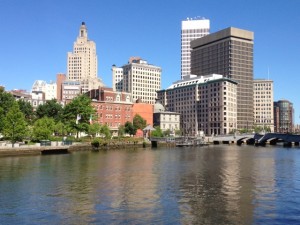
You’ve seen it so many times before it’s almost a cliché: An anti-tax, corporate front group produces a report on taxes, and Rhode Island ranks unfavorably.
Invariably next, the fringe-right echoes the findings as confirmation of the correctness of their own solution to every problem, tax cuts for corporations and the wealthy paid for by slashes to government services and to benefits of government workers… win/win in their book. While it’s dangerous to dismiss these out of hand, the rest of us have learned to take these “studies” with a big grain of salt.
That’s why the headline of the recent PBN story caught my interest, “Providence ranked 15th in U.S. for favorable business tax structure.”
Say what? I almost didn’t believe it myself. Who produced that thing, Kate Brewster? Actually it was KPMG, not exactly a liberal front group:
Among a survey of 73 U.S. cities that offer the most favorable tax structures for businesses, Providence ranked 15th overall…
KPMG compiled the ranking using total tax index, a measure used to compare tax burden by comparing the total actual tax cost in U.S. dollars for each jurisdiction…
Among the U.S. cities, Providence ranked ninth for corporate income tax rate, 13th for its other corporate taxes rate, 59th for its statutory labor costs and 15th for its total effective tax rate.
That’s right, 9th and 13th for corporate taxes, offset only by our labor costs, little surprise given the higher cost of living in Northeastern cities. Is there more we can do to attract business? Sure, but the next time you read one of those studies suggesting cuts to spending on infrastructure, schools, and social programs to pay for reductions in corporate taxes don’t forget to ask yourself, is that really the best way to attract business?
]]>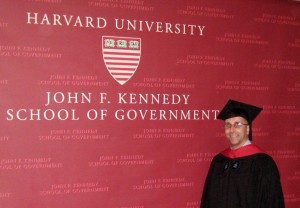 It was good timing for me that former RI Future owner Brian Hull had to focus on finishing his studies at Harvard University earlier this year, giving me an opportunity to take over this site from him. Now it’s good timing for Rhode Island.
It was good timing for me that former RI Future owner Brian Hull had to focus on finishing his studies at Harvard University earlier this year, giving me an opportunity to take over this site from him. Now it’s good timing for Rhode Island.
Hull just graduated from Harvard’s prestigious Kennedy School of Government with a Masters Degree in Public Policy focusing on economic development and social and urban policy and he would make an excellent and logical appointment to the state Economic Development Board.
In the wake of the 38 Studios fallout, there are currently as many as five vacancies on the EDC board. Instead of filling all those slots with the same type of local business leaders that typically inhabit the seats at the EDC table, Gov. Chafee should consider naming at least one person – and probably more – who understands economic development from a systematic perspective.
“The structure of the RIEDC lacks a presence of a theoretical understanding of economic development planning and that’s something I could bring to the table,” Hull told me, when I told him about my idea for this post the other day. “Rather than looking for the next best ‘deal’ which is how things are currently done, RIEDC really needs to focus on the larger picture of the state’s economy in relation to the region, play on its assets and strengths, and think about a long-term growth strategy that targets resources in focused way.”
Hull, who lives in Providence with his wife and plans to stay in the home they own, tried to get a job in economic development in Rhode Island. Instead, he landed a job as a senior policy analyst with the Initiative for a Competitive Inner City, a Boston-based “nonprofit research and strategy organization and the leading authority on U.S. inner city economies and the businesses that thrive there.”
While he’ll be working with cities all across the country, he’s also looking for a way to stay involved with economic development here in Rhode Island, too.
I asked Hull what kind of experience he has successfully implementing economic development plans, and he sent me this list:
Rethinking Workforce Development for Providence’s Labor Force: A skills gap analysis for Providence’s labor force, review of the workforce development system servicing Providence residents, and a comprehensive actionable list of recommendations and implementation procedures to modify the current training system in order to improve service delivery, achieve better employment outcomes for Providence residents, and better engage low-income and low-literacy populations in job training programs to facilitate their employment.
City of Worcester Economic Development Plan: Formulate an economic development plan for the City of Worcester by undertaking four-part strategic assessment of the local economy to understand its strengths, weaknesses, and opportunities for leveraging additional economic development through a baseline analysis, development agenda, strategic focus on key areas, and detailed research and analysis. The report (1) identifies key economic development opportunities and challenges in Worcester, (2) offers a strategy of proactive change to overcome those challenges and capitalize on opportunities, and (3) provides first steps to prioritize, target, and implement the strategy. The strategy synthesizes a variety of economic development approaches, and is rooted in Worcester’s context – inherent assets, established partnerships, existing business support capacity, and common goals for the City’s future.
City of Miami Transportation and Logistics Business Cluster Analysis: This report analyzes on the competitiveness of Miami’s transportation and logistics cluster, with a focus on marine transportation, by identifying the strengths and weaknesses of the Port of Miami in relation to other ports in the state, in the country, and in the world. It also recommends specific changes to ensure that the Port of Miami retains and grows its current market share in the transportation of high-value added goods and the global cruise industry.
New Orleans Broad Street Four Corners: This report proposes a strategic partnership in New Orleans, LA between Broad Community Connections, a nonprofit that focuses on revitalizing a section of the Broad Street corridor, and the Crescent City Community Land Trust, a new land trust in New Orleans that will focus on commercial and residential redevelopment. As part of the analysis, we examined current models of community land trusts in the United States that have experience with commercial properties.
Typically, people are appointed to the Economic Development Corporation’s board because they have been successful in business. Hull has been successful in economic development. The two are not the same thing. We ought to have people who have succeeded in business on that board, but we ought to also have people who have succeeded in economic development.
Hull has done both, having also run a successful photography shop, more akin to the kind of businesses that are the back bone of the Ocean State, for 15 years before going to Harvard.
If you agree that Hull should be appointed to the EDC board, tweet this article to @LincolnChafee or send the governor’s office an email: governor@governor.ri.gov.
]]>

